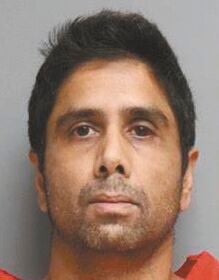A Southern California radiologist accused of driving his family off the Pacific Coast Highway last year in a murder-suicide attempt was approved for a two-year mental health diversion program and released from custody July 8, San Mateo County District Attorney Steven Wagstaffe said.
His defense attorney, Joshua Bentley, did not respond to request for comment.
On Jan. 2, 2023, Dharmesh A. Patel was driving a Tesla southbound on the highway, with his wife and two children, after spending the holidays with family in the Bay Area. Just outside the Tom Lantos Tunnels, he turned off the road and the car went over a cliff, crashing into the rocky shore and surf below.
Although the car fell 250 feet, all four survived the crash, with one child suffering minor injuries. Prosecutors maintained the crash was intentional and charged Patel on multiple counts, including attempted murder and child abuse, according to court records.
Patel will avoid jail time after Judge Susan Jakubowski concluded June 20 that his major depressive disorder qualified him for mental health diversion.
He will be required to follow a strict treatment plan, including twice-weekly tests to prove he’s taking his medication, and reside at his parent’s house in Belmont according to the DA’s Office.
Additionally, Patel will be required to wear a GPS monitoring system, will not be allowed to leave San Mateo County and will return to court weekly for progress updates.
His wife Neha Patel repeatedly told rescuers that Dharmesh Patel intentionally drove his Tesla off the cliff and that her husband was depressed and needed a psychological evaluation, according to an unsealed search warrant affidavit.
In a May hearing, however, she spoke virtually for about 10 minutes and said she wanted all charges dropped.
To qualify for mental health diversion court, the defense had to prove Patel had a mental illness that caused the crime or was a significant factor in it. They must also show that he can be treated over the course of a year and that he is not a present threat to the community.
Wagstaffe attributed the conclusion of the case to fairly recent mental health diversion court law.
“Five years ago, he would have been looking at seven years to life in state prison,” he said. “The law has softened up quite a bit.”

























(0) comments
Welcome to the discussion.
Log In
Keep the discussion civilized. Absolutely NO personal attacks or insults directed toward writers, nor others who make comments.
Keep it clean. Please avoid obscene, vulgar, lewd, racist or sexually-oriented language.
Don't threaten. Threats of harming another person will not be tolerated.
Be truthful. Don't knowingly lie about anyone or anything.
Be proactive. Use the 'Report' link on each comment to let us know of abusive posts.
PLEASE TURN OFF YOUR CAPS LOCK.
Anyone violating these rules will be issued a warning. After the warning, comment privileges can be revoked.